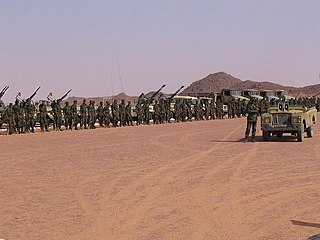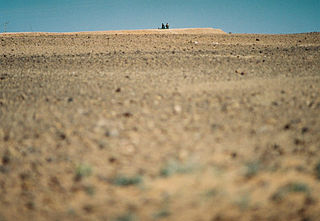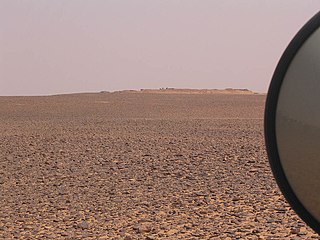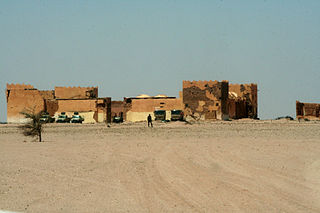
Mohamed Abdelaziz was the 3rd Secretary General of the Polisario Front, from 1976, and the 1st President of the Sahrawi Arab Democratic Republic from 1982, until his death in 2016.

The Madrid Accords, formally the Declaration of Principles on Western Sahara, was a treaty between Spain, Morocco, and Mauritania setting out six principles which would end the Spanish presence in the territory of Spanish Sahara and arrange a temporary administration in the area pending a referendum.

Tiris al-Gharbiyya was the name for the area of Western Sahara under Mauritanian control between 1975 and 1979.

The Reguibat is a Sahrawi tribal confederation of mixed Arab and Sanhaja Berber origins. The Reguibat speak Hassaniya Arabic, and are Arab in culture. They claim descent from Sidi Ahmed al-Reguibi, an Arab Islamic preacher from Beni Hassan who settled in Saguia el-Hamra in 1503. They also believe that they are, through him, a chorfa tribe, i.e. descendants of Muhammad. They are divided into two main geographical divisions - the Reguibat as-Sahel and Reguibat Lagouacem - who are in turn divided into sub tribes. Religiously, they belong to the Maliki school of Sunni Islam.
Amgala is an oasis in Western Sahara. It is located between Tifariti and Smara, outside the Moroccan Wall in the area controlled by the Polisario.

The Western Sahara conflict is an ongoing conflict between the Sahrawi Arab Democratic Republic/Polisario Front and the Kingdom of Morocco. The conflict originated from an insurgency by the Polisario Front against Spanish colonial forces from 1973 to 1975 and the subsequent Western Sahara War against Morocco between 1975 and 1991. Today the conflict is dominated by unarmed civil campaigns of the Polisario Front and their self-proclaimed SADR state to gain fully recognized independence for Western Sahara.
Since the end of the 1980s, several members of POLISARIO have decided to discontinue their military or political activities for the Polisario Front. Most of them returned from the Sahrawi refugee camps in Algeria to Morocco, among them a few founder members and senior officials. Some of them are now actively promoting Moroccan sovereignty over Western Sahara, which Morocco considers its Southern Provinces. Their individual reasons to stop working for POLISARIO, as reported in the media, vary, but include allegations of human rights violations, monopolization and abuse of power, blackmailing and sequestering the refugee population in Tindouf, and squandering foreign aid. They also claim POLISARIO is controlled by the government of Algeria and as one former member of POLISARIO put it, "[was] a group of Moroccan students who were urging the Spanish colonizer to leave and who had never claimed independence or the separation from motherland Morocco."

Greater Mauritania is a term for the Mauritanian irredentist claim that generally includes the Western Sahara and other Sahrawi-populated areas of the western Sahara Desert. The term was initially used by Mauritania's first President, Mokhtar Ould Daddah, as he began claiming the territory then known as Spanish Sahara even before Mauritanian independence in 1960.

The Western Sahara War was an armed struggle between the Sahrawi indigenous Polisario Front and Morocco from 1975 to 1991, being the most significant phase of the Western Sahara conflict. The conflict erupted after the withdrawal of Spain from the Spanish Sahara in accordance with the Madrid Accords, by which it transferred administrative control of the territory to Morocco and Mauritania, but not sovereignty. In late 1975, the Moroccan government organized the Green March of some 350,000 Moroccan citizens, escorted by around 20,000 troops, who entered Western Sahara, trying to establish a Moroccan presence. While at first met with just minor resistance by the Polisario Front, Morocco later engaged a long period of guerrilla warfare with the Sahrawi nationalists. During the late 1970s, the Polisario Front, desiring to establish an independent state in the territory, attempted to fight both Mauritania and Morocco. In 1979, Mauritania withdrew from the conflict after signing a peace treaty with the Polisario Front. The war continued in low intensity throughout the 1980s, though Morocco made several attempts to take the upper hand in 1989–1991. A cease-fire agreement was finally reached between the Polisario Front and Morocco in September 1991. Some sources put the final death toll between 10,000 and 20,000 people.

Mohamed-Fadel Ould Ismail Ould Es-Sweyih was a Sahrawi nationalist politician, member of the Polisario Front. He was a prominent member of the Sahrawi Arab Democratic Republic diplomatic corps, holding several posts as SADR ambassador or Polisario Front representative.
The First Battle of Amgala was fought between 27 and 29 January 1976 around the oasis of Amgala, Western Sahara, about 260 kilometres (160 mi) west of the border with Algeria. Units from the Algerian Army were attacked by units from the Royal Moroccan Armed Forces on the night of 27 January. The Algerians withdrew after fighting for 36 hours. However, the retaliation came fairly soon, between 13 and 15 February 1976 Polisario units defeated Moroccan troops in the second Battle of Amgala.
The Battle of Guelta Zemmur occurred between 13 and 23 October 1981 when Polisario Front attacked the Moroccan garrison at Guelta Zemmur in Western Sahara. Using heavy military equipment including tanks and surface-to-air missiles, the Polisario Front defeated the Moroccan garrison forces entrenched around the town. Three to Five Moroccan planes were shot down, including a C-130 Hercules. Moroccan armed forces then aggressively counterattacked and drove the Polisario out of the town, but later abandoned it as they retrenched behind the belt.

The Battle of Mahbes was fought on 12 January 1985 during the Western Sahara War. As part of its Grand-Maghreb offensive, the Polisario Front, with heavy means, breaks through the wall of sand defended by the Royal Moroccan armed forces.

The Battle of Al Mahbes was fought on 14 October 1979 during the war in Western Sahara. The Polisario Front annihilated a battalion of the Royal Moroccan Armed Forces.
Lahbib Sid Ahmed Aouba, known as Lahbib Ayoub was a Western Saharan militant and co-founder of the Polisario Front. He led many conflicts with the group before joining Morocco in 2002.
The Attack on Lebouirate was a significant military engagement that took place during the ongoing Western Sahara conflict between the Moroccan government and the Polisario Front.

The Battle of Ain Ben Tili was launched by the Polisario Front on January 19, 1976. Situated in the northern region of Mauritania, Ain Ben Tili was located just a few kilometers away from the town of Bir Lehlou, near the border with Western Sahara. Following repeated Polisario attacks, Mauritanian troops withdrew from the town five days later.
The Attack on Tichla took place on July 12, 1979, in the town of Tichla, in Western Sahara. It marked the final engagement between Mauritania and Polisario before the peace treaty in Algiers and Mauritania's withdrawal from the Western Sahara War.

The Battle of Smara occurred between October 5 and 8, 1979, during the Western Sahara War at Smara, between the Royal Moroccan Armed Forces and the Polisario Front. Both sides asserted divergent narratives of the battle.
The Battle of Bir Anzarane constituted a significant military confrontation between the armed forces of the Sahrawi Arab Democratic Republic, represented by the Polisario Front, and the Moroccan Armed Forces. The confrontation took place in the oasis of Bir Anzarane, situated in Western Sahara, a territory that is the subject of a claim by both parties.













